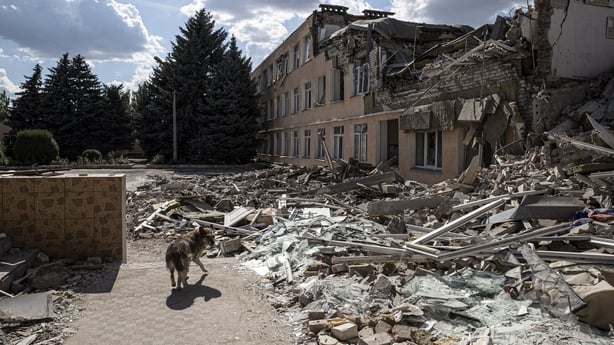The first ships to export Ukraine grain from the country's Black Sea ports may move within a few days, a UN spokesperson has said.
The move is under a deal agreed on Friday by Ukraine, Russia, Turkey and the United Nations.
A joint coordination centre will liaise with the shipping industry and will publish detailed procedures for ships in the near future, said deputy UN spokesperson Farhan Haq.
Senior government officials in Ukraine also told a news conference they hoped the first grain shipment under the deal would be from the port of Chornomorsk this week, and that shipments could be made from all ports included under the deal within two weeks.
Infrastructure Minister Oleksandr Kubrakov said there were no limits on how much grain could be exported under the agreement reached on Friday, which also allows got the export and import of fertiliser.
"We believe that over the next 24 hours we will be ready to work to resume exports from our ports," said deputy infrastructure minister Yuriy Vasyukov.
"We are talking about the port of Chornomorsk, it will be the first, then there will be Odesa, then the port of Pivdeny."
Russia has brushed aside Western and Ukrainian alarm that a missile strike by its forces on Ukraine's port of Odesa could derail the deal.
The Kremlin said Saturday's strike - denounced by Ukraine's President Volodymyr Zelensky as "barbarism" - had only targeted military infrastructure and would not impact the grain export arrangements in the deal reached on Friday in Istanbul.
A global wheat shortage and soaring European energy prices are some of the most far-reaching effects of Russia's invasion of Ukraine, threatening millions in poorer countries with hunger and prompting fears in Europe over heating supplies this winter.
Kremlin spokesman Dmitry Peskov said Russia had targeted military infrastructure in its Odesa missile strike on Saturday.
The attack came just hours after Kyiv and Moscow had secured the conflict's first diplomatic breakthrough since February in a deal to restart crucial grain exports from Ukraine.

"These strikes are connected exclusively with military infrastructure," Mr Peskov said.
"They are in no way related to infrastructure that is used for the export of grain. This should not affect - and will not affect - the beginning of shipments."
The hit on Odesa had raised questions about whether the deal would go ahead or if all sides would honour the agreements reached in Istanbul.
Ukraine's grain exports have been stalled since 24 February, when Russia sent tens of thousands of troops into Ukraine in what it calls a "special military operation".
As part of the deal, the UN and Russia also signed an memorandum of understanding, committing the UN to facilitating unimpeded access of Russian fertiliser and other products to global markets.
"The UN should implement its part about the indirect restrictions imposed against Russian grain and fertiliser shipments," Mr Peskov said.
"There are no direct (restrictions), but there are indirect ones that do not allow us to fully fulfil these shipments, which are vital for international markets, and especially those regions where hunger is beginning to become especially palpable."

As the war enters its sixth month, the Ukrainian military reported widespread Russian shelling in eastern Ukraine overnight.
It said Russia continued to prepare for an assault on Bakhmut in the industrial Donbas region, which Russia aims to seize on behalf of separatist proxies.
Near Kharkiv, Ukraine's second largest city located in the country's northeast, three people were trapped under the rubble of a cultural centre in the town of Chuhuyiv and a fourth person was wounded, President Zelensky's office said.
Ukraine said its forces had used US-supplied HIMARS rocket systems to destroy 50 Russian ammunition depots since receiving the weapons last month.
Russia did not immediately comment but its Defence Ministry said its forces had destroyed an ammunition depot for HIMARS systems.

